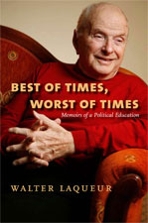Best of Times, Worst of Times: Memoirs of a Political Education

Walter Laqueur
A memoir by a highly respected historian and political commentator
Walter Laqueur has been writing and teaching for over six decades, primarily in the fields of 20th century history and politics. In this engaging memoir, Laqueur focuses on the political and historical events that have shaped his thinking and inspired his intellectual work. He describes growing up in Nazi Germany; discusses Marxism, the Soviet Union and the part he played in Cold War politics; and reflects on the image his generation had of Zionism, Israel and the Middle East. Laqueur shares his appraisals of Beltway politics and think tanks, then concludes with his views on guerilla warfare, terrorism and the future of Europe. In this age of specialization, he remains a shrewd and thoughtful generalist.
Purchase from Brandeis University Press
Expand All
“In brief, the lessons of history can be misunderstood and misapplied. But in our time the greater danger as far as democratic societies are concerned is the lack of memory and understanding of the dynamics of societies and governments that are not like them. And nothing is more difficult than altering these societies to dangers facing them. Public opinion does not want to be bothered by anything but a clear and present danger, and those who warn are bound to be voices calling in the wilderness. And even farsighted politicians cannot afford to move too far ahead of public opinion. In other words, warnings in democratic societies will usually come late, and sometimes too late.”
“We have been told that the war on terror will end because all wars eventually end. This idea sounds reassuring, but it resets on the mistaken assumption that the war against terrorism is a war that is somehow comparable to other wars. It is nothing of the sort; it is a condition, a state of affairs, the contemporary manifestation of political conflicts in an age in which regular, traditional wars have become too expensive and modern war too risky and destructive. Terrorism cannot be stamped out altogether unless human conflicts are somehow abolished. With great luck, terrorism might be reduced to manageable proportions, and if failed countries cannot be restored to normality their problems might be isolated so that local conflagrations may burn themselves out after a while.”
“Walter Laqueur has resolved the tension between being a highly respected historian, normally arms length from events themselves, and having been an active observer and player during ‘his’ twentieth century. With the knowledge and experience of his long life, he deserves the title of an ‘old wise man.’” —World Security Network
About the Author
Walter Laqueur was a former director of the Institute of Contemporary History and the Wiener Library in London and founder and editor with George Mosse of the Journal of Contemporary History and of Survey. He was a professor emeritus of history of ideas at Brandeis University and Georgetown University and visiting professor of history and government at Harvard, University of Chicago, Tel Aviv, and Johns Hopkins University. He authored or co-authored dozens of books, including Generation Exodus: The Fate of Young Jewish Refugees from Nazi Germany and The Changing Face of Anti-Semitism: From Ancient Times to the Present Day.
